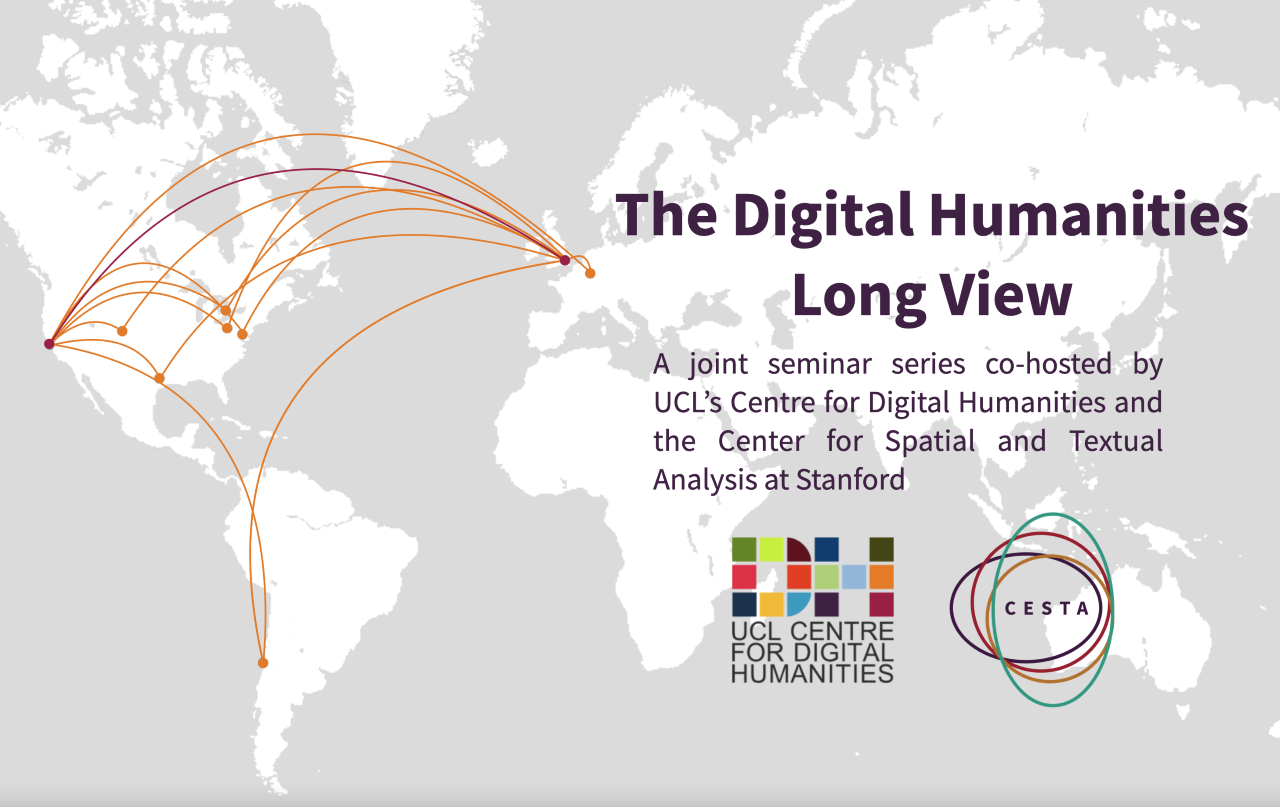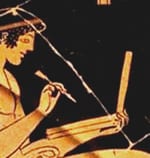Long View Seminar – Reflecting on our First Year
By Adam Crymble, on 27 July 2021
In a year dominated by a global pandemic and both remote working and teaching, we lost many of the traditional ways that we as scholars could stay connected. One of those, the traditional extra-curricular seminar series that was a coming together space for people at different stages of their career, had to go online. And that’s just where we went.
While elements of the seminar culture have not been easy to replicate online, the shift to virtual did present some opportunities, one of which was to work collaboratively across what would otherwise be prohibitively wide distances. In this case, it was a chance for the UCLDH team to work together with colleagues at Stanford’s CESTA (Center for Spatial and Textual Analysis) to co-host the Digital Humanities Long View seminar during the spring of 2021. It was a chance to share scholarly culture, to build new bridges, and to help postgraduate students get involved in networking and professional development opportunities that were increasingly difficult to arrange during a pandemic.

Logo of the Digital Humanities Longview Seminar, with a world map showing the location of each of the seminar’s speakers and of the two co-host organisations (Stanford CESTA & UCLDH).
The Long View for us was about understanding that research happens in context. About asking questions of how Digital Humanities (DH) got where it is today. Our seminar series explored some of the key socio-historical, political and cultural contexts of DH research as a means of building understandings of how we all ended up here and what that means for the future of the field. It’s been an opportunity for newcomers to understand how the field has developed, and for established practitioners to consider their work as part of a larger movement with competing influences, ambitions, and blindspots.
Having finished our first programme of talks, we’re incredibly pleased with the Long View series. We were grateful to host 11 wonderful speakers from five countries and three different linguistic backgrounds. We had the support of 17 different postgraduate students and early career researchers who acted as respondents to the papers and co-hosted the proceedings. And we had tremendous and engaged audiences from around the world, reaching 650 people across the series.
Some of the talks have been video recorded and remain online on the CESTA website, and we invite you to watch them if you missed them live: https://cestastanford.github.io/schedule.html
And we’re pleased to announce that we plan to continue our collaborative seminar series next year, building upon what we’ve established with our friends at Stanford.
That means we’ll once again be on the lookout for postgraduate students who want to get involved and build both their skills and professional networks. If any UCL postgraduate students or offer holders for 2021-22 would like to represent UCLDH as a postgraduate respondent at next year’s events, please contact Dr Adam Crymble directly for an informal conversation.
Finally, a huge thanks to our speakers, convenors, colleagues, and respondents, who supported this seminar: Ian Milligan (Waterloo), Jessica Marie Johnson (Johns Hopkins), Zephyr Frank, Quinn Dombrowski, Mark Algee-Hewitt (Stanford), Riva Quiroga (Programming Historian), Scott Weingart (Notre Dame), Nickoal Eichmann-Kalwara (Colorado), Amy Earhart (Texas A&M), Valérie Schafer (Luxembourg), Jane Winters (London), Agnieszka Backman, Amanda Wilson Bergado, William Parish, Daniel Bush, Giovanna Ceserani, Laura Stokes, Anna Toledano, Victoria Rahbar, Maciej Kurzynski, Yunxin Li, Lakmali Jayasinghe, Merve Tekgurler, Mae Velloso-Lyons (CESTA); Adam Crymble, Julianne Nyhan, Lucy Stagg, Hannah Smyth, Nenna Orie Chuku, Madeline Tondi, George Cooper, Jin Gao, Malithi Alahappruna, Opher Mansour, Marco Humbel (UCL) and Urszula Pawlicka-Deger (KCL). It has been a wonderful and collegial opportunity and we valued it tremendously.
 Close
Close


